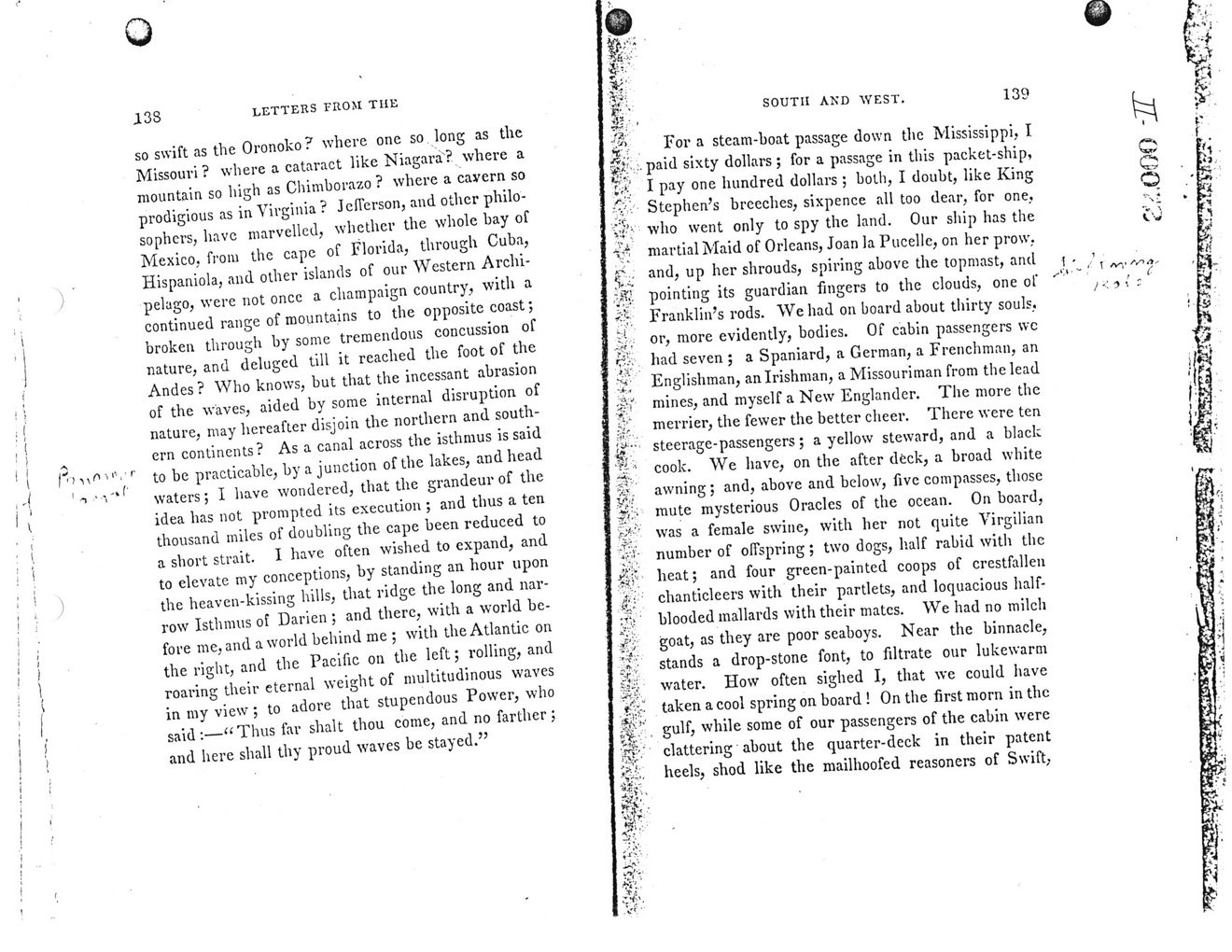This text was obtained via automated optical character recognition.
It has not been edited and may therefore contain several errors.
JL38 LETTERS FROM TIIE so swift as the Oronoko? where one so long as the Missouri ? where a cataract like Niagara ? where a mountain so high as Chimborazo ? where a cavern so prodigious as in Virginia ? Jefferson, and other philosophers, have marvelled, whether the whole bay of Mexico, from the cape of Florida, through Cuba, Hispaniola, and other islands of our Western Archipelago, were not once a champaign country, with a continued range of mountains to the opposite coast; broken through by some tremendous concussion of nature, and deluged till it reached the foot of the Andes ? Who knows, but that the incessant abrasion of the waves, aided by some internal disruption of nature, may hereafter disjoin the northern and southern continents? As a canal across the isthmus is said to be practicable, by a junction of the lakes, and head waters; I have wondered, that the grandeur of the idea has not prompted its execution ; and thus a ten thousand miles of doubling the cape been reduced to a short strait. I have often wished to expand, and to elevate my conceptions, by standing an hour upon the heaven-kissing hills, that ridge the long and narrow Isthmus of Darien ; and there, with a world before me, and a world behind me ; with the Atlantic on the right, and the Pacific oil the left; rolling, and roaring their eternal weight of multitudinous waves in my view; to adore that stupendous Power, who said:—“Thus far shalt thou come, and no farther; and here shall thy proud waves be stayed.” w.; §; .*> & T;*' \V' ■5V-. SOUTH AND WEST. 139 For a steam-boat passage down the Mississippi, I paid sixty dollars; for a passage in this packet-ship, I pay one hundred dollars ; both, I doubt, like King Stephen’s breeches, sixpence all too dear, for one, who went only to spy the land. Our ship has the martial Maid of Orleans, Joan la Pucelle, on her prow, and, up her shrouds, spiring above the topmast, and pointing its guardian fingers to the clouds, one of Franklin’s rods. We had on board about thirty souls, or, more evidently, bodies. Of cabin passengers wc had seven ; a Spaniard, a German, a Frenchman, an Englishman, an Irishman, a Missouriman from the lead mines, and myself a New Englander. The more the merrier, the fewer the better cheer. There were ten steerage-passengers; a yellow steward, and a black cook. We have, on the after deck, a broad white awning; and, above and below, five compasses, those mute mysterious Oracles of the ocean. On board, was a female swine, with her not quite Virgilian number of offspring; two dogs, half rabid with the heat; and four green-painted coops of crestfallen chanticleers with their partlets, and loquacious halfblooded mallards with their mates. We had no milch goat, as they are poor seaboys. Near the binnacle, stands a drop-stone font, to filtrate our lukewarm water. How often sighed I, that we could have taken a cool spring on board ! On the first morn in the gulf, while some of our passengers of the cabin were clattering about the quarter-deck in their patent heels, shod like the mailhoofed reasoners of Swift,

Hancock County Letter-from-Gulf-of-Mexico-(4)